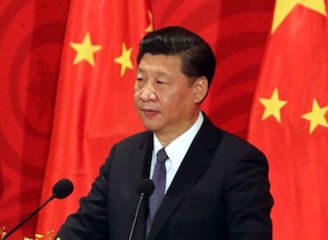Chinese President pledged to make any coronavirus vaccine universally available once it’s developed, part of an effort to defuse criticism of his government’s response to a pandemic that has killed more than 315,000 people around the world.
In a speech on Monday to the World Health Assembly, the governing body of the Geneva-based World Health Organization, Xi called for greater international cooperation in fighting the pandemic. He also said China will provide $2 billion over two years to support the fight. Taiwan dropped a request to be included in the gathering after objections from Beijing.

China has come under fire from the U.S., European Union and Australia over its initial handling of the outbreak and subsequent heavy-handed response to any criticism. Xi’s full-fledged backing of the WHO contrasts with the Trump administration’s move to suspend funding for the global health body after accusing it of being biased toward China.
Xi’s pledge to make any vaccine universally available comes amid growing concern that countries will put national interests first in the quest for a protective shot, seen as the key to getting economies moving again. The EU’s own proposal to the assembly struck a similar tone, highlighting the need for all countries to have “unhindered timely access” to shots, medicines, diagnostics and any other technologies needed to fight the pandemic.
Among the dozens of vaccine projects under way worldwide, China has five candidates already in human trials. More will enter such tests next month.
In his speech, Xi repeated his government’s assertions that China acted with transparency and responsibility all along, and provided timely information to the WHO. While Xi said the world needs “to continue supporting global research by scientists on the source and transmission of virus,” his government has resisted calls led by the EU and Australia for an investigation into the virus’s origins.
Seeking Source
The WHO said this month that it’s sought discussions on a new mission to China to seek the source of the virus. International experts were part of a previous delegation to the country in February, at the height of China’s outbreak.
Anti-epidemic cooperation “is a top priority,” Foreign Ministry spokesman Zhao Lijian told a regular briefing in Beijing, responding to a question on whether China supports an inquiry into an independent investigation. “The time to immediately start reviewing and tracing the virus’s origins is not yet ripe.”
The EU’s draft resolution, backed by countries including Brazil, Japan and Canada, suggested evaluating the WHO’s response to the pandemic “at the earliest appropriate moment.” Director-General Tedros Adhanom Ghebreyesus said he welcomed calls for an impartial independent and comprehensive evaluation.
“It must encompass the entirety of the response by all actors in good faith,” he said in a speech.
U.S. President Donald Trump, facing an election in November, has regularly blamed China for failing to prevent the virus from spreading beyond its borders, while aiming regular broadsides against the WHO.
Information Sharing
The agency “failed at its core mission of information sharing,” Health and Human Services Secretary Alex Azar told the assembly. Secretary of State Michael Pompeo blasted Tedros for failing to invite Taiwan, which Beijing views as a province, as an observer to the meetings.
“The director-general’s lack of independence deprives the assembly of Taiwan’s renowned scientific expertise on pandemic disease, and further damages the WHO’s credibility and effectiveness at a time when the world needs it the most,” Pompeo said.
The WHO has said Tedros has no mandate to offer Taiwan an invitation to the assembly because there is “no clear support” among member states. Some international legal experts dispute that position, saying that inviting Taiwan as an observer wouldn’t supplant the government in Beijing as the sole representative to the United Nations.
Taiwanese Foreign Minister Joseph Wu said on Monday that Taiwan was dropping its campaign to be included in this week’s assembly as the proceedings had been shortened due to the virus, and would resume it later in the year when meetings would be conducted normally.
With no end in sight to the political wrangling, efforts to find treatments and vaccines are heating up. Some companies involved in the development of protective shots have suggested countries that provide funding will get first dibs, even while the WHO pushes a proposal that aims to ensure broad access to treatments and vaccines while offering an appropriate reward to creators.
AstraZeneca Plc Chief Executive Officer Pascal Soriot said the U.K. will take priority for the University of Oxford’s fast-moving effort. French drugmaker Sanofi sparked outrage after CEO Paul Hudson said its vaccine, which received funding from the U.S., will likely be used there initially. Sanofi said later that it would be available to everyone.










